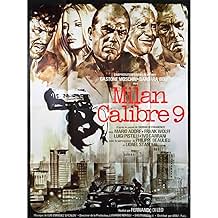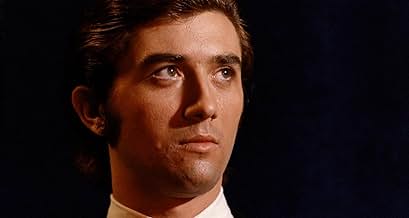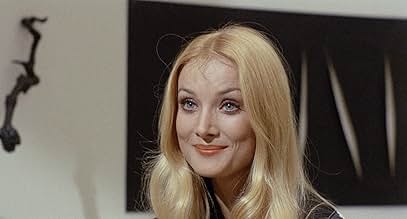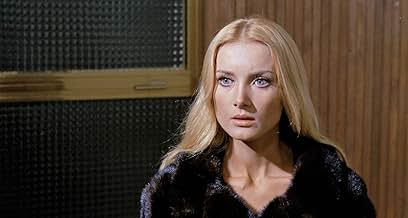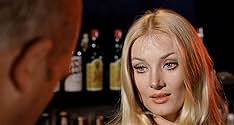एक पूर्व गैंगस्टर अपनी पुरानी जीवन शैली को पुनः अपनाने के लिए मजबूर हो जाता है, जब उसके हिंसक, ईर्ष्यालु पूर्व सहयोगी और पुलिस को लगता है कि उसे चुराए गए 300, 000 डॉलर का ठिकाना पता है.एक पूर्व गैंगस्टर अपनी पुरानी जीवन शैली को पुनः अपनाने के लिए मजबूर हो जाता है, जब उसके हिंसक, ईर्ष्यालु पूर्व सहयोगी और पुलिस को लगता है कि उसे चुराए गए 300, 000 डॉलर का ठिकाना पता है.एक पूर्व गैंगस्टर अपनी पुरानी जीवन शैली को पुनः अपनाने के लिए मजबूर हो जाता है, जब उसके हिंसक, ईर्ष्यालु पूर्व सहयोगी और पुलिस को लगता है कि उसे चुराए गए 300, 000 डॉलर का ठिकाना पता है.
फ़ीचर्ड समीक्षाएं
That doesn't stop Rocco harassing the hell out of him, however. First he's taken to a scrapyard to have the crap beaten out of him, then Rocco and his goons turn up at Ugo crap hotel and destroy the place, but Ugo still denies taking the cash. Ugo goes to his old partner Phillip Leroy for help, but the man can only offer him money and advises him to go see the Mikado (although he does give Rocco a kicking for good measure).
The Mikado, knowing that if Ugo has the money, then there's no point in killing him, hires him as a runner and has him work for Rocco, but things go from bad to worse when a red-clad figure who has been following Ugo kills one of the goons, steals more cash, and sets in motion a series of events that ends in a bloodbath. I suppose this being 1972 they had to throw in a mysterious killer somewhere.
This all sounds like your usual Euro-crime movie, but there also an ongoing socio-political debate between two cops (An animated Frank Wolff and a subdued Luigi Pistilli) about the differences in the rich and the poor, and the North and the South of the country. This is reflected in the Mikado's speech about the old and new mafia, and how honour is not practised by the 'new' criminals, which is something that comes back to haunt the film's bleak ending.
Just about every actor involved here stands out. Phillip Leroy tries to live in peace but his hand is forced by events beyond his control – his weary resignation at what he has to do in the end is a highlight, Gastone Moschin is no oil painting but as the quiet, brooding lead plays a very good burned out criminal, but Mario Adorf blows them all of the screen as the manic 'moustache Pete' who may be violent and cruel, but still knows how to stick to the code of honour. His character is no fool either, as a tense, and mostly silent scene between Ugo and himself in a police station shows.
The soundtrack is a killer too! Although not my favourite Poliziotteschi film (for that is what they are called), it's probably my favourite Fernando De Leo film. Oh! Special mention to the set design of Barbara Bouchet's flat – amazing use of black and white.
This was one of two films released after Frank Wolff's suicide. His co- star here, Luigi Pistilli, would also go on to commit suicide after receiving bad reviews and having a public meltdown (much later, in 1996). On a happy note Phillip Leroy and Mario Adorf still walk the Earth!
Milan Calibre 9 is one of crime specialist director Fernando Di Leo's most famous movies. He was probably the best director in the Italian poliziotteschi and is responsible for several other classics of that sub-genre, such as The Boss and The Italian Connection. Like those, this one is also a fast paced, tough and violent flick with some excellently staged action scenes. The big shoot-out at the outdoor garden party stands out as an example of the latter. But mainly the story is driven more by interesting characters and a fairly complex plot with several twists and turns.
The Milan setting itself is used well, with a good sense of place. Unlike the other Italian thriller genre of the 70's, the giallo, the poliziotteschi were virtually all set in Italy itself. Many, like this one, featured the city in question in their title. They were more realistic than their more stylised gialli counterparts and I guess they connected with their audience in a slightly different way in that they provided thrills along with observations about contemporary crime concerns. Milan Calibre 9 like other Di Leo crime films has some such social commentary. The corruption in the justice system and the degradation of the mafia are subjects that are touched upon.
It benefits from a very strong cast. Mario Adorf is in his element as the sadistic gangster Rocco, he owns every scene he is in. Barbara Bouchet is as exquisite as always, she plays a night-club dancer who is introduced to us in a mouth-wateringly erotic dance routine. Lionel Standler is very convincing in the role of the sinister crime boss The Americano; while the two cops are played by reliable Italian genre film regulars Luigi Pistilli and Frank Wolff.
All in all, this is a quality action-thriller that remains relatively obscure. It's a very good example of what the Italian crime movie was all about.
Gastone Moschin is very good in the lead as the apparent excon and victim of the Mafia's attention, but the acting prize goes to Mario Adorf's Mafia Lieutenant. He also has the best line, right at the end - which I cannot give away as it would spoil the suspense.
The main reason why this film excels is thanks to the fantastic performances. Gastone Moschin leads the film with a performance that reminded me of something Ray Winstone would deliver. He provides a likable anti-hero, while Mario Adorf gets to enjoy himself with the meatiest role in the film. Barbara Bouchet co-stars and looks great, especially in her dancing scene in a bar. Bouchet is one of my absolute favourite Italian actresses, and I always enjoy seeing her in films - especially when they're up to the standard of this one. The film does somewhat adhere to the pitfall plaguing many Italian thrillers - that being that the story doesn't always make sense, but generally; the plot flows really well and the twists and turns ensure that it never gets boring. The climax of the film is excellent, and director Fernando Di Leo excellently pulls off the double twist at the end, which both resolves the story and provides neat entertainment. Overall, Milano Calibre 9 may not be the most well known cult Italian film - but it's one that shouldn't be missed by fans of this sort of stuff, and therefore comes highly recommended.
Resume:
First watch: 2019 / How many: 1 / Source: DVD / Rating: 8.5
क्या आपको पता है
- ट्रिवियाFernando Di Leo admitted that, with a critical eye, the scenes at the Police Station among the "fascist" Commissario and the "communist" Mercuri should be taken off because they take strength out of the main story. But the work of actors Frank Wolff and Luigi Pistilli was so good that he couldn't absolutely cut it off.
- गूफ़During the brief gun fight, the handgun sound effects do not match the barrel flashes. One flash, 3 gunshots.
- भाव
Rocco Musco: [in Italian version]
[last lines, grabbing Luca's hair]
Rocco Musco: You... do not kill a man like Ugo Piazza, TREACHEROUSLY!
Rocco Musco: [slams Luca's head on the edge of the cabinet for the first time] You... shouldn't even touch a man like Ugo Piazza!
Rocco Musco: [slams Luca's head on the edge of the cabinet for the second time] You... should NEVER EVER touch a man like Ugo Piazza!
Rocco Musco: [slams Luca's head on the edge of the cabinet for the third time] You... when you see someone like Ugo Piazza, YOU HAVE TO TIP YOUR HAT!
Rocco Musco: [slams Luca's head repeatedly until he dies and then spits at his corpse] TIP YOUR HAT! TIP YOUR HAT! TIP YOUR HAT! TIP YOUR HAT!
- कनेक्शनFeatured in History of the Erotic Cinema (1982)
टॉप पसंद
- How long is Caliber 9?Alexa द्वारा संचालित
विवरण
- चलने की अवधि1 घंटा 42 मिनट
- रंग
- पक्ष अनुपात
- 1.85 : 1
इस पेज में योगदान दें


